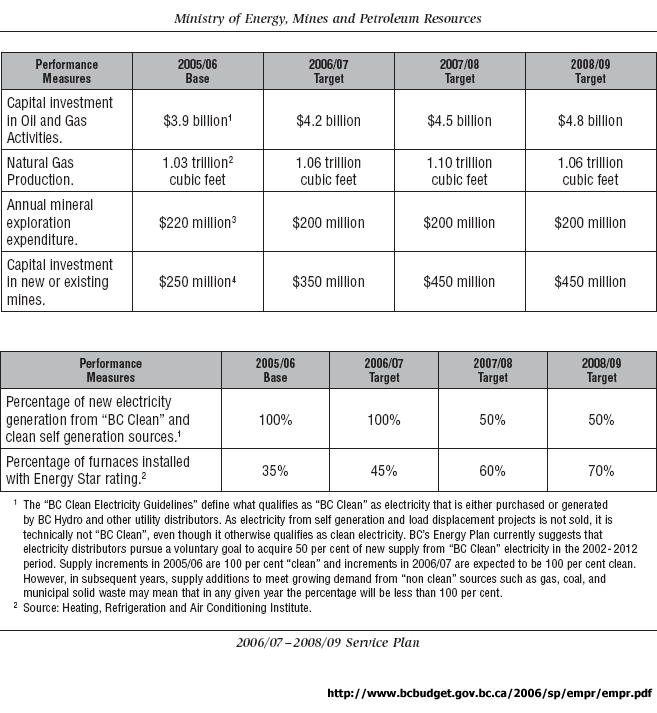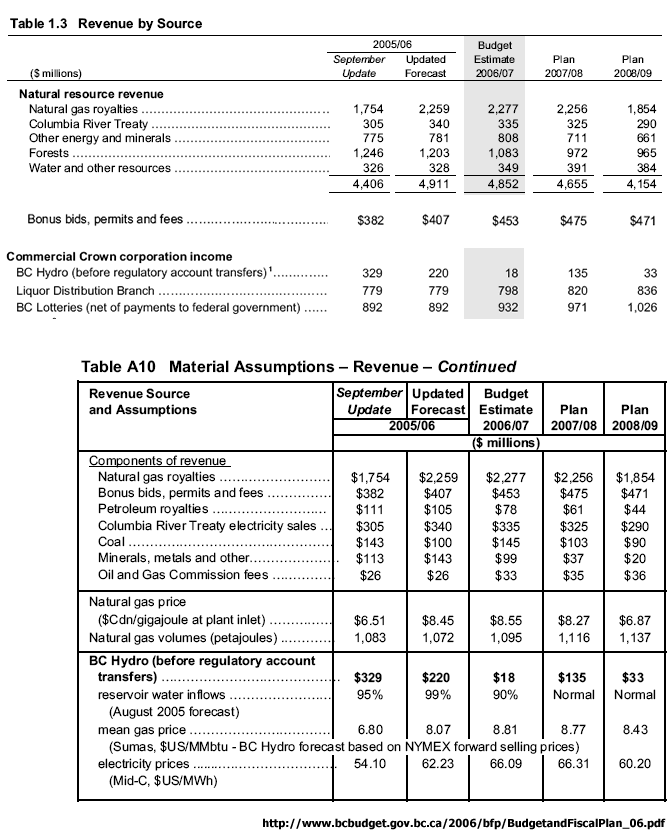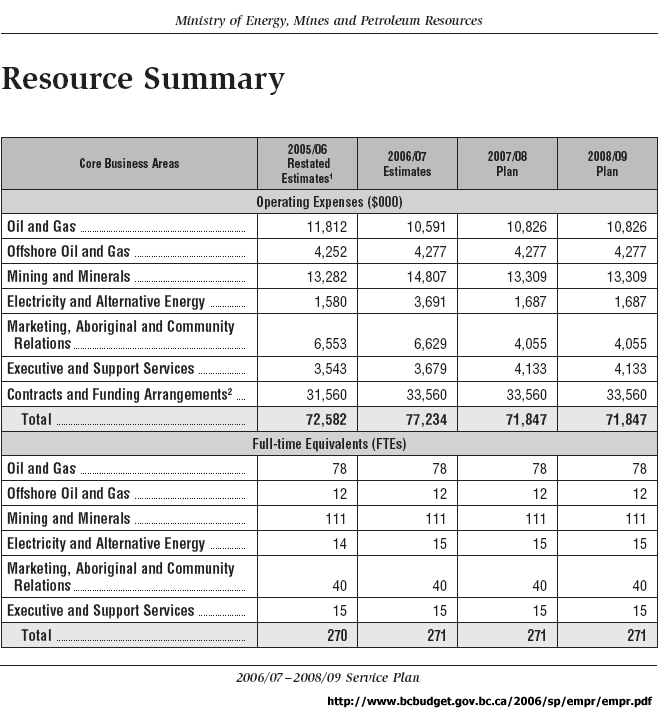

Energy in the 2006 BC Throne Speech and Budget
The government has given almost no attention to energy in its 2006 Speech from the Throne. Does it mean anything?
The speech, which was delivered on February 14, 2006, makes no reference at all to natural gas, offshore oil and gas development, Site C, coal, coalbed methane, etc. "Alternative energy" and "conservation" got one mention each. Can that be taken as a good thing? Or is this just tokenism, or a distraction, while it's business as usual - or more coal than ever - behind these ceremonial statements? Why no mention of greenhouse gases and Kyoto?
We are expecting revisions to the energy plan from the BC government in the next months. There is one reference each in the Throne Speech to "expanded energy vision" and "updated energy vision". Vague language, signifying something, or nothing?
A new B.C. Foundation for Natural Resources and Engineering Research will also be launched this year. It will support advanced training, research and development, technology transfer, and commercialization in natural resources, engineering, and applied sciences.This will help keep our resource sector competitive and sustainable in the face of challenges like the mountain pine beetle, while growing new sectors and fueling economic growth.
Alternative energy will form an integral part of your government’s expanded energy vision. It is a critical part of your government’s goal to improve air and water quality, and fisheries management.
That goal also obliges us to set new goals in conservation. The updated energy vision will include new conservation targets to help make British Columbia electricity self-sufficient within the decade ahead.
---
Your government is opening up the Port of Prince Rupert and opening up the North to capitalize on all the advantages our Pacific Gateway has to offer. It is transforming the future for Northern British Columbians and citizens in every region, through new investments in regional development and transportation infrastructure.
Speech from the Throne
http://www.legis.gov.bc.ca/38th2nd/4-8-38-2.htm
The 2006/07 Budget tells us that it is indeed business as usual. In the $35 billion ($35,364,000,000) budget, the government is expecting to take in $4.85 billion from natural resources, another $486 million from related permits and fees. Only $1.08 billion is to come from forests.
http://www.bcbudget.gov.bc.ca/2006/bfp/BudgetandFiscalPlan_06.pdf
The budget should be read in the context of the Ministry of Energy, Mines and Petroleum Resources (MEMPR) 2006/07 - 2008/09 Service Plan.
http://www.bcbudget.gov.bc.ca/2006/sp/empr/empr.pdf
For all the talk about alternative energy, at the Ministry of Energy, Mines and Petroleum Resources (MEMPR) a brief comparison might illustrate how much is wind and how much substance. 78 people work in Oil and Gas. 12 people work in the Offshore Oil and Gas Division with expenditures of $4.28 million per year in the next three years ($357,000 per person). Compare that to 15 people working in the Electricity and Alternative Energy Division with expenditures of $3.69 million this year, $1.58 million last year, $1.69 million in the next two years, averaging $2.23 million per year over four years ($149,000 per person). See the table at the bottom of this message.
Do you remember the Five Great Goals for a Golden Decade, announced by the BC Liberals in last year's Speech from the Throne? Goal Four was "To lead the world in sustainable environmental management with the best air and water quality and the best fisheries management, bar none." You cynics! I bet you thought the government had forgotten the promise.
Never! Here's how the Ministry of Energy, Mines and Petroleum Resources plans to help deliver.
In support of Great Goal Four, the Ministry will pursue best practices for oil and gas development, maintain effective, efficient regulation of mines and mineral exploration sites aimed at health, safety and environmental best practices, and promote development and use of alternative energy technology, and energy efficiency measures. The Ministry is at the forefront of developing resource management and community engagement measures to ensure that British Columbians lead the world in sustainable environmental management and enjoy the best air and water quality.For Great Goal Four, key initiatives include the Oil and Gas Regulatory Improvement Initiative to create a more effective and efficient results-based oil and gas regulatory framework. The BC Mining Plan commits to developing faster and simpler approaches to multi-agency approvals of exploration and mining. As an example, Ministry staff is working with industry and the Ministry of Environment to develop Best Management Practices for mineral exploration in British Columbia. This initiative is an essential part of implementing an efficient and timely regulatory regime for mineral exploration while maintaining high environmental standards. With regard to energy and the environment, the Ministry is working in partnership with the federal government, First Nations, communities, the private sector and others to promote the development and use of alternative energy sources such as wind, solar and hydrogen, and energy efficiency measures, to conserve our energy resources while delivering a healthier living and work environment for British Columbians.
That fills me with confidence. How about you?
MEMPR has three Goals of its own.
Goal # 1 is "thriving and competitive energy, mineral and petroleum resource sectors". You have to read this stuff, but it includes "a new, contemporary Energy Plan to guide future planning and growth" as well as the usual increase investment, enhance predictability, maximize area, remove barriers, stimulate development, streamline regulation, blah, blah.
Goal # 2 is "Safe and environmentally responsible energy, mineral and petroleum resource development and use." This is where alternative energy comes into its own. Here it is:
Objective 2: Increased development and use of alternative energy technology, and energy efficiency and conservation measures.Strategies:
1. Continue to implement “Energy Efficient Buildings: A Plan for BC”.
2. Pursue strategic alliances with the federal government to further develop the hydrogen fuel cells industry and other technology that supports alternative energy.
In support of Goal #1 and Goal #2, EMPR includes the two tables that follow. Note that the future targets for "BC Clean" electricity decline from 100% (of what? you might ask, cynically) to 50%. Now, that's an achievement!
But note also the increase in the number of furnaces with Energy Star ratings. Note where the data came from - industry projections. Is that a difficult or great leap forward? Is that even a challenge? Isn't it just slightly smarter consumerism, easily driven by appropriate pricing signals and incentives? What does it have to do with alternative energy at EMPR? Why do I find it so irritating?

Goal # 3 is "The Ministry, First Nations communities and industry working cooperatively for the responsible development and use of BC’s energy, mineral and petroleum resources." More development and use, perhaps not so much working cooperatively. But we'll see...
And finally, a little more about that new Energy Plan from the EMPR Service Plan:
One of our major new initiatives is a renewed Energy Plan, aimed at developing a contemporary blueprint to guide the future management and use of BC’s energy resources over the long term. The Province plans to build on the 2002 Plan with a new energy vision for electricity, oil and gas, and alternative energy, with greater emphasis on conservation, efficiency and innovation. New policy and regulatory frameworks will be developed to ensure this new energy vision can be achieved. Outcomes are expected to include: new energy efficiency measures, a strategy to continue to grow the oil and gas industry, increased promotion of exploration, and a strategy to reduce transportation emissions.
In the end, some key words that are missing throughout: sustainable, climate change, greenhouse gases.
Energy in the Budget
Here are a few interesting excerpts from the budget, showing the energy and resource specific items. Note the increasing roles that alcohol and gambling play. Note the inconsistent gas prices used by the government for its royalty forecast, on the one hand, and BC Hydro for its costs, on the other. The government has predicted a $1.40 drop in gas prices in the final year. Inexplicable, given that demand is unlikely to mitigate in the next two years, no new North American supply areas will be on stream by then, and LNG imports won't be significant so soon. BC Hydro, on the other hand, sees no such price reduction.


Posted by Arthur Caldicott on 22 Feb 2006